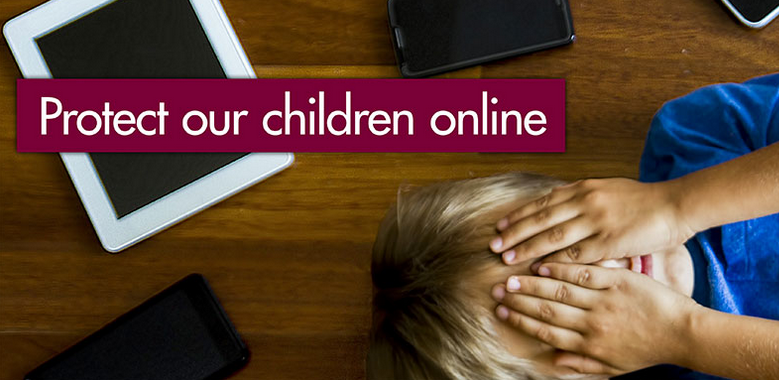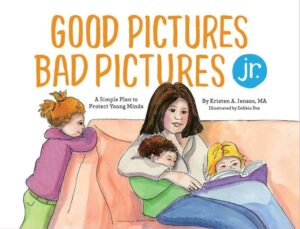
October is “Pornography Awareness Month;” awareness of this destructive addiction is vital, particularly as it exists in many forms across the internet and lurks to ensnare young, curious minds. Pornography manifests itself in a plethora of ways which includes pictures, videos, audio, written materials, video games, and social media posts, all of which may hook an unsuspecting soul. It’s important to make our children and teens aware of these dangers because they will likely run across pornography unsuspectingly and, if drawn into its clutches, will have devastating affects upon their minds and relationships. It’s no wonder that Solomon warned in Proverbs chapter four to “Keep thy heart with all diligence; for out of it are the issues of life.”
Pornography is a deception and a danger to all age groups and both genders, but, today, let’s address a few warnings, particularly where our children are concerned.
First: recognize that exposure isn’t an if but a when. With the rise of smart phones and numerous other devices hooked up to the internet, pornography is rampantly available and even pushed on all age groups, including children. An article dealing with the dramatic increase of pornography use among young adults attributes this to ease of access through cellphones.
This extensive report states: “Apart from those who seek out pornography, many people get unexpectedly exposed to pornography due to the amount of explicit content that circulates online. One study reports that 93% of boys and 62% of girls were exposed to internet pornography during their teenage years. Another study reports that of 9–19-year-olds, 57% came into contact with pornography online, and less than a quarter of those intentionally searched for porn. More specifically young adults, of 18–19-year-olds, 80% saw porn, and only 26% reported that it was on purpose.
“Some ways people are exposed to pornography without pursuing it include popup advertisements, junk mail, clicking on a pornography website, and receiving pornography from a family member, friend, or associate. Considering the addictive nature of pornography, unwanted exposure to pornographic content is problematic because it increases the viewer’s risk of developing a pornography habit.”
Taking steps to limit the likelihood of first exposure for our children is important. Some of the ways to do this are: 1) Limit screen time and make sure you’re with your child when they view. 2) Install good filters and be aware of particular apps and traps to avoid. Websites like Protect Young Eyes and Covenant Eyes are very good resources from which one can learn and find help. 3) Have intentional conversations with your child/grandchild, warning them of what they may see and the dangers of it. Be sure to help them recognize that there is no shame in accidentally running across pornography, encouraging them to come to you when it does happen. Of course, these conversations need to be age-appropriate.
Second: with increased availability comes normalization. Many children may not even be aware that what they’re viewing IS pornography, particularly if their friends are introducing it to them or they’ve seen “soft porn” on television, at the movies, billboards, etc. Pornography has also been normalized through library books at school which contain graphic content, some so-called “sex-ed” courses, or various “Pride” events both in school and in other public venues.
Here’s one website which offers a list of signs showing that your child may be viewing pornography. Their list includes:
* Signs of premature sexual activity, increased interest in sexuality and the use of sexual language
* Unexplained charges on your or their bank cards
* They switch screens as soon as you come near the computer
* Inappropriate and explicit pop-ups start to appear on your computer
* Changes in behavior – perhaps becoming much more defensive, aggressive or secretive
* Your child’s browser history may reveal search terms used or sites visited that you feel are inappropriate.
* Maybe starting to explore their sexuality and have changing attitudes towards women and girls or members of the same sex in the context of sexual relationships
 Defend Young Minds is a great organization whose aim is to help prevent early exposure and addiction to pornography. Their website has many good helps on working with your children to best equip them in avoiding this danger and what to do should exposure happen. We have, in the past, offered their first book Good Pictures Bad Pictures (and Good Pictures Bad Pictures Jr.), which can be purchased at their website. “92% of its over 2,000 reviews said that this book was a vital tool for parents to teach their children the importance of treating their own and others’ bodies with respect.” “Their goal is to keep an open dialogue about sexuality, body autonomy, personal privacy, and pornography from a young age in families.”
Defend Young Minds is a great organization whose aim is to help prevent early exposure and addiction to pornography. Their website has many good helps on working with your children to best equip them in avoiding this danger and what to do should exposure happen. We have, in the past, offered their first book Good Pictures Bad Pictures (and Good Pictures Bad Pictures Jr.), which can be purchased at their website. “92% of its over 2,000 reviews said that this book was a vital tool for parents to teach their children the importance of treating their own and others’ bodies with respect.” “Their goal is to keep an open dialogue about sexuality, body autonomy, personal privacy, and pornography from a young age in families.”
Again, have intentional, age-appropriate talks with your children and grandchildren NOW – regarding device use, what’s appropriate for viewing, and warn them of pornography’s addictive, destructive manner as well as its ever-growing hunger within the one ensnared by this sin. Be sure to share with them the grace of a loving and forgiving Heavenly Father. Emphasize the importance of protecting their eyes and their own bodies. Because,
Third: normalization leads to desensitization. Sin embraced, even unintentionally, can produce a calloused heart or mind. No one is beyond the reach of the Holy Spirit’s power, but we desire the best for our children and pornography is one of Satan’s tools to destroy them. Here’s a list of some of the ways these verbal and visual images can affect children: (Taken from this website)
* It may distort their understanding and expectation of sex and relationships
* It can affect their development specifically if they are younger when they first view it
* They can show signs of early sexualized behavior and it may affect their sexual identity
* It can lead to inappropriate expectations of girls and women and treating them more like objects
* Girls may feel pressure to live up to these unrealistic expectations of sex
* May develop feelings of anxiety or depression
* Become obsessed with acting out adult sexual acts they’ve seen
* For boys, it may shape their attitudes about masculinity and sexuality
* It can also affect their body image and sense of what is normal for a girl or a boy
 God designed and gave our human sexuality as a beautiful gift to us. We must protect our children and their minds by intentionally teaching them that they were created by God to glorify Him. Their bodies were created wonderfully for God’s use and this sacred gift of body and sexuality is only to be shared intimately with that one special person within the God-designed bounds of marriage.
God designed and gave our human sexuality as a beautiful gift to us. We must protect our children and their minds by intentionally teaching them that they were created by God to glorify Him. Their bodies were created wonderfully for God’s use and this sacred gift of body and sexuality is only to be shared intimately with that one special person within the God-designed bounds of marriage.
May we regularly remind our children/grandchildren that our God is merciful and loving; He is also holy and has standards of expectation. Breaking those standards is sin and comes with dire consequences, both here and in the hereafter. BUT GOD is forgiving of those who repent and humble themselves; He transforms lives, minds, and souls. The soul caught in the net of pornography is still able to be redeemed, set free, and transformed, just as with any other sin.
To view this article in your browser, Click Here
For more information, articles and newsletters, please check out our website at https://americandecency.org/
You can support ADA financially by visiting: https://give.cornerstone.cc/americandecency

Call us:
231-924-4050Email us:
info@americandecency.orgWrite us:
American Decency AssociationCopyright 2024 American Decency